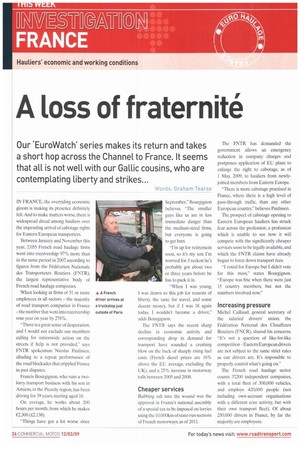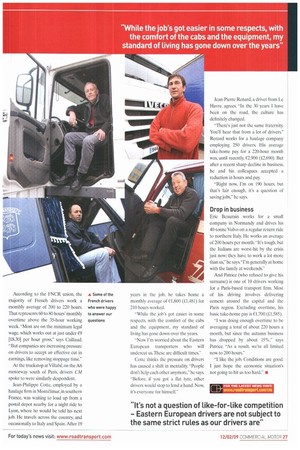A loss of fraternite
Page 26

Page 27

If you've noticed an error in this article please click here to report it so we can fix it.
Our 'EuroWatch' series makes its return and takes a short hop across the Channel to France. It seems that all is not well with our Gallic cousins, who are contemplating Liberty and strikes...
Vords: Graham Tearse
IN FRANCE, the overriding economic gloom is making its presence definitely felt. And to make matters worse, there is widespread dread among hauliers over the impending arrival of cabotage rights for Eastern European transporters Between January and November this year, 2,055 French road haulage firms went into receivership: 97% more than in the same period in 2007, according to figures from the Federation Nationale des Transporteurs Routiers (FNTR), the largest representative body of French road haulage companies When looking at firms of 51 or more employees in all sectors the majority of road transport companies in France the number that went into receivership rose year on year by 278%.
"There is a great sense of desperation, and I would not exclude our members calling for nationwide action on the streets if help is not provided," says FNTR spokesman Nicolas Paulissen, alluding to a repeat performance of the road blockades that crippled France in past disputes Francis Bourgignon. who runs a twolorry transport business with his son in Amiens, in the Picardy region, has been driving for 39 years, starting aged 18.
On average, he works about 200 hours per month, from which he makes €2,300 (£2,138).
"Things have got a lot worse since
September,Bourgignon believes. -The smaller guys like us are in less immediate danger than the medium-sized firms, but everyone is going to get hurt.
"I'm up for retirement soon, so it's my son I'm worried for. I reckon he's probably got about two or three years before he has to pack it in.
"When I was young, to this job for reasons of liberty, the taste for travel, and some decent money. but if I was 18 again today, I wouldn't become a driver," adds Bourgignon.
The FNTR says the recent sharp decline in economic activity and corresponding drop in demand for transport have sounded a crushing blow on the back of sharply rising fuel costs (French diesel prices are 16% above the EU average, excluding the UK). and a 25% increase in motorway tolls between 2005 and 2008. I was drawn
Cheaper services
Rubbing salt into the wound was the approval in France's national assembly of a special tax to be imposed on lorries using the 10,000krn of state-run sections of French motorways, as of 2011. The FNTR has demanded the government allows an emergency reduction in company charges and postpones application of EU plans to enlarge the right to cabotage, as of 1 May, 2009, to hauliers from newlyjoined members from Eastern Europe.
"There is more cabotage practised in France, where there is a high level of pass-through traffic, than any other European country.believes Paulissen.
The prospect of cabotage opening to Eastern European hauliers has struck fear across the profession, a profession which is unable to see how it will compete with the significantly cheaper services soon to be legally available, and which the FNTR claims have already begun to force down transport fees.
"1 voted for Europe but I didn't vote for this mess," states Bourgignon. "Europe was fine when there were just 15 country members, hut not the numbers involved now."
Increasing pressure
Michel Caillaud, general secretary of the salaried drivers' union, the Federation National des Chauffeurs Routiers (FNCR), shared his concerns "It's not a question of like-for-like competition -Eastern European drivers are not subject to the same strict rules as our drivers are. It's impossible to properly control what's going on."
The French road haulage sector counts 37,200 independent companies, with a total fleet of 300,000 vehicles, and employs 420,000 people (not including own-account organisations with a different core activity, but with their own transport fleet). Of about 250.000 drivers in France, by far the majority are employees. According to the FNCR union, the majority of French drivers work a monthly average of 200 to 220 hours. That represents 60 to 80 hours' monthly overtime above the 35-hour working week. "Most are on the minimum legal wage, which works out at just under €9 [E8.30] per hour gross,says Caillaud. "But companies are increasing pressure on drivers to accept an effective cut in earnings, like removing stoppage time."
At the truckstop at Villabe, on the A6 motorway south of Paris, drivers CM spoke to were similarly despondent.
Jean-Philippe CotLe, employed by a haulage firm in Montelimar, in southern France, was waiting to load up from a postal depot nearby for a night ride to Lyon, where he would be told his next job. He travels across the country, and occasionally to Italy and Spain. After 19 years in the job, he takes home a monthly average of €1,600 (€1,481) for 210 hours worked.
-While the job's got easier in some respects, with the comfort of the cabs and the equipment. my standard of living has gone down over the years.
-Now I'm worried about the Eastern European transporters who will undercut us. These are difficult times:" Cone thinks the pressure on drivers has caused a shift in mentality. "People don't help each other anymore," he says. "Before, if you got a flat tyre, other drivers would stop to lend a hand. Now, it's everyone for himself." Jean-Pierre Renard, a driver from Le Havre, agrees. "In the 30 years I have been on the road, the culture has definitely changed.
"There's just not the same fraternity. You'll hear that from a lot of drivers," Renard works for a haulage company employing 250 drivers. His average take-home pay for a 220-hour month was, until recently, €2,900 (f2,690). But after a recent sharp decline in business, he and his colleagues accepted a reduction in hours and pay.
"Right no I'm on 190 hours, hut that's fair enough, it's a question of saving jobs," he says.
Drop in business
Eric Beaurain works for a small company in Normandy and drives his 40-tonne Volvo on a regular return ride to northern Italy. He works an average of 200 hours per month. "It's tough, but the Italians are worst-hit by the crisis just now; they have to work a lot more than us," he says. "I'm generally at home with the family at weekends."
And Patrice (who refused to give his surname) is one of 10 drivers working for a Paris-based transport firm. Most of his driving involves delivering cement around the capital and the Paris region. Excluding overtime, his basic take-home pay is €1,700 (11.585).
"I was doing enough overtime to be averaging a total of about 220 hours a month, but since the autumn business has dropped by about 15%," says Patrice. "As a result, we're all limited now to 200 hours."
"I like the job. Conditions are good. I just hope the economic situation's not going to hit us too hard." •
rpv FOR THE LATEST HEWS VISIT: www.poadtransportcomtm
































































































































































